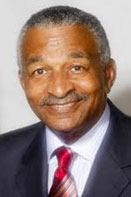
Politicians capitalize on stories of struggle
By Jim Clingman
One of the main themes in the political conventions was centered on how hard it was for the speakers’ families, their parents and grandparents, and how they struggled to make it. Virtually every top speaker reflected on the hard times they went through and how their relatives struggled to put food on the table, how their parents worked two jobs to support their families, and how they lived in a small apartment. They wanted to believe they were “special” because they knew what it was like to struggle. It was kind of funny hearing all the stories and seeing them worn as badges of honor that merited our votes.
Well, I may as well get in on the act with my personal story. My great-grandfather was enslaved in North Carolina. My grandfather somehow got a little piece of land and turned it into the business of farming and keeping chickens and hogs. He dug a well and used an outhouse, which I also had to use when I visited during the summer. My father left home as a teenager, after not finishing high school, came to Cincinnati and started working as a janitor and night watchman.
The first four of his five children, me included, were born at home. We lived in a three-room apartment where the living room was converted to a bedroom every night by a rollaway bed for my older brother and me, and the bathroom was in the hall for others to use as well. Our parents took care of us through my father’s job that paid $35 per week. My father was crippled but walked to work every day.
My mother went to work as a domestic in the white suburbs, which ended up being the norm for many Black women back then. Remember the movie, “The Help?” She later got a job at a hospital making a whopping 50 cents per hour as a cafeteria helper. She worked at that same hospital for 28 years and when she retired around 1980, she was earning $4.50 per hour. By the way, her relatives worked in the mines and lived in the “hollows” of West Virginia, scratching out a living and owing their wages to the company store.
As for me, I worked odd jobs from the age of eight, selling papers, loading trucks, hauling groceries in my wagon, paper routes, working in a grocery store and washing cars. With a story like this, I should run for office.
Struggle? Yes, we as well as millions of other families in this country struggled mightily to make ends meet. So is it the exception or the rule? Is struggle the measure we should use to elect lawmakers and presidents?
I really think it’s disingenuous for candidates to use struggle as a way to get votes. Sadly, the electorate is swayed by emotional sentiments, meaningless platitudes and a competition among candidates to determine who had it worse when they were growing up. Most of these guys and gals are multi-millionaires and they are reaching back in their pasts to tug at our heart strings; quite frankly, it’s insulting.
When I think of the decade-old struggle of the first responders to the 911 tragedy, as they die from lung diseases, I know what real struggle is all about. These men and women have waited for politicians to bail them out and all they hear each anniversary is that they were “heroes.” They are struggling to stay alive, pay their bills and take care of their families, all while dying of the cancer they developed while saving the lives of others. Now that’s struggle, folks.
Look at the struggling people of Haiti, recently having taken another blow from Hurricane Isaac. They have not yet received the funds that were donated to them after the earthquake of 2010. Hundreds of thousands are still living in tents and unsanitary conditions while politicians make no move to relieve them of their suffering.
What about the folks in New Orleans who have still not recovered from Hurricane Katrina, and have not been made whole after billions in relief funds were donated to them? Some are still living in temporary housing even though the storm took place in 2005. And let’s not even talk about veterans; there is so much hypocrisy from politicians toward that group that it’s not even funny.
I don’t want to hear about struggle from politicians. They definitely are not struggling now with their health plans and benefits and other perks. Their struggle, if they insist on having one, should be to help those who are really struggling in today’s economy. They should be struggling to fix the broken places, like Nehemiah did; they should be struggling to help their people, like Esther did; they should be struggling to feed the hungry and heal the sick, like Jesus did.
The significance of struggle is not in the words we speak; it’s in the deeds we perform.
Jim Clingman, founder of the Greater Cincinnati African American Chamber of Commerce, is the nation’s most prolific writer on economic empowerment for Black people. He is an adjunct professor at the University of Cincinnati and can be reached through his website, blackonomics.com
